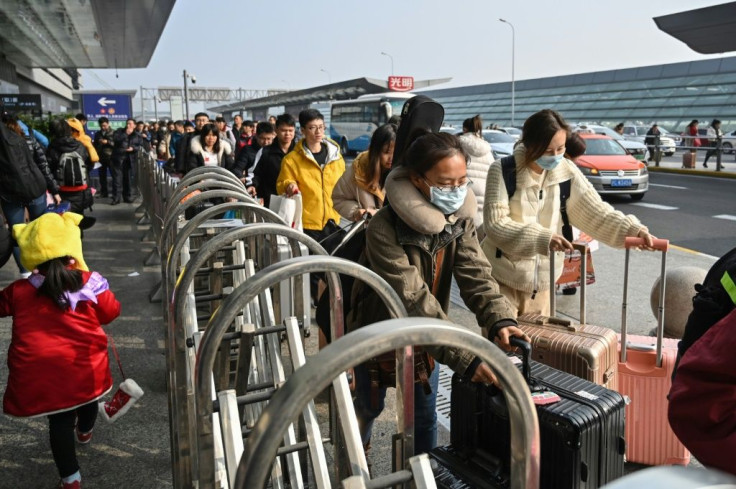Tuesday's Stock Market Open: US Equities Fall On Worries Over New Contagious Virus In China

KEY POINTS
- The new coronavirus in China has infected at least 300 people.
- Bank of Japan kept interest rates unchanged, while raising 2020 growth forecasts.
- Asian markets plunged overnight
U.S. stocks traded lower on Tuesday, after the long weekend, as China warned of the outbreak of a contagious new virus.
The Dow Jones Industrial Average dropped 23.74 points to 29,324.36 while the S&P 500 slipped 2.09 points to 3,327.53 and the Nasdaq Composite Index edged down 0.9 of a point to 9,388.05.
The outbreak of a new contagious coronavirus in China that has killed at least six people recalled fears from the Severe Acute Respiratory Syndrome, or SARS, crisis from 2003. The new virus has infected at least 300 people. Asian stock markets dropped overnight.
“For the market, the more meaningful driver still remains the economic cycle and earnings momentum,” said Fan Cheuk Wan, Asia chief market strategist at HSBC Private Bank. “Based on previous experience we have come across during SARS, the impact of the virus is likely to be short-lived.”
U.S. Treasury Secretary Steven Mnuchin told The Wall Street Journal on Tuesday that a phase two trade deal between China and the U.S. might not eliminate all existing tariffs. “We may do 2A and some of the tariffs come off. We can do this sequentially along the way,” he said.
At the World Economic Forum in Davos, Switzerland, President Donald Trump hailed the U.S. economy.
“America’s newfound prosperity is undeniable, unprecedented and unmatched anywhere in the world,” Trump said. “America achieved this stunning turnaround not by making minor changes to a handful of policies, but by adopting a whole new approach centered entirely on the well-being of the American worker. Every decision we make on taxes, trade, regulation, energy, immigration, education and more is focused on improving the lives of everyday Americans. Only when governments put their own citizens first will people be fully invested in their national futures.”
The Bank of Japan kept its key interest rate unchanged at minus-0.1% and also upgraded its growth forecast for fiscal 2020 to 0.9% from 0.7%.
U.K. employment grew by 208,000 for the three months to November as the unemployment rate remained at 3.8%, the Office for National Statistics reported Tuesday.
White House top economic adviser Larry Kudlow said U.S. economic growth will exceed 3% in 2020.
“This is a long cycle and what you’ve got here in the Trump years is essentially a mini upcycle,” Kudlow said. “You’ve gone from 1.5% to 2% growth. We had it going at almost 4% then the Fed tightened.”
John Augustine, chief investment officer at Huntington Private Bank, thinks the U.S. stock market can keep moving higher.
“We think stocks could run for a while, absent some event,” he said. “We’re starting to see signs of confirmation elsewhere. It’s not just the Nasdaq and the big tech names.”
But hedge fund billionaire Paul Tudor Jones is skeptical about the recent rally.
“We are just again in this craziest monetary and fiscal mix in history. It’s so explosive. It defies imagination,” Jones, founder of Tudor Investments, said at the World Economic Forum in Davos.
Overnight in Asia, markets finished broadly lower. China’s Shanghai Composite dropped 1.41%, while Hong Kong’s Hang Seng plunged 2.81%, and Japan’s Nikkei-225 fell 0.91%.
In Europe markets finished mixed, as Britain’s FTSE-100 dropped 0.53%, France’s CAC-40 fell 0.54% and Germany’s DAX gained 0.05%.
Crude oil futures dropped 0.41% at $58.30 per barrel and Brent crude fell 0.74% at $64.72. Gold futures tumbled 0.16%.
The euro slipped 0.02% at $1.1094 while the pound sterling gained 0.27% at $1.3044.
© Copyright IBTimes 2024. All rights reserved.




















